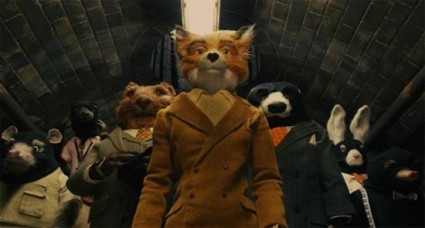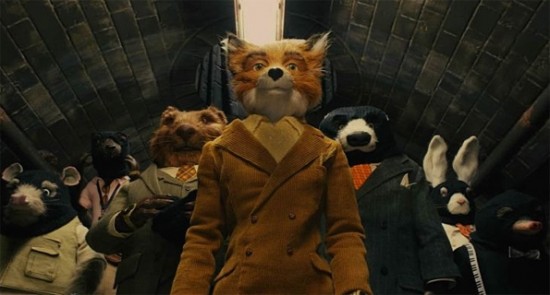 “I’ve got an idea”: Mr. Fox and friends fight the power.
“I’ve got an idea”: Mr. Fox and friends fight the power.
I’m writing a post that I shouldn’t have to write: a plea to get you, political-minded foodie that you are, to go to whatever lengths necessary to see Fantastic Mr. Fox.
How do I know you haven’t? Because the box-office numbers stink: the film has grossed just $20 million domestically since being released in November. That’s a decent weekend for a superhero blockbuster. Even adding foreign receipts–$17 million–the film hasn’t made back its $40 million budget. Forty million bucks sounds like a king’s ransom to me; but it’s equivalent to a dime for every dollar spent by James Cameron to make Avatar (which I haven’t seen).
These box-office data aren’t mere trivia. If this picture goes up in flames, Fantastic Mr. Fox’s director, Wes Anderson, might never get a decent budget again. According to Richard Brody’s profile in the The New Yorker, Anderson’s previous two films (the wonderful Life Aquatic and the pretty-good Darjeeling Limited) bombed at the box office. Like baseball umpires, Hollywood suits frown at three strikes. “Anderson is acutely aware that much depends on the reception of Fantastic Mr. Fox,” The New Yorker dryly notes.
And why do I give a damn–and insist that you do, too? First of all, Fox is a beautiful piece of visual storytelling, based on a book by the peerless children’s author Roald Dahl. Its lead roles are voiced by two of Hollywood’s very few genuine stars at the height of their powers–George Clooney and Meryl Streep. The stop-action animation is downright artisanal. We need good popular filmmaking in this country; otherwise, it’s all dumb-guy fart comedies and brainless action sequels. Well, here it is. Support it.
Even more importantly for our purposes, the film dramatizes the brutal and arbitrary power of industrial meat giants–and depicts a daring (and successful) revolt against them. As conjured up by Anderson, Dahl’s “equally mean” farmers, Boggis, Bunce, and Bean, are stand-ins for larger-than-life, yet quite small-minded, U.S. meat moguls like Don Tyson and “Bo” Pilgrim. The film’s end–which I won’t spoil–is a wry commentary on vertical integration and consolidation in the food industry.
Clooney’s wily Mr. Fox is a classic Wes Anderson father figure–unreliable, borderline negligent, never dull. But he’s also a daring, resourceful activist who uses his charisma to form powerful coalitions. And he does so with style and brio. In our time of political fecklessness and timidity, a rebellious fox with a plan makes a worthy hero.
I don’t want to oversell the allegory. Like all of Anderson’s films, this one is mainly about family dynamics that manage to be both sad and zany at the same time. It’s also about cinematic pleasure. (Few food lovers will fail to be delighted by the feast scene, which features the voice of Mario Batali as a bossy rabbit-chef). I’ve seen the film twice, with a broad range of people: from film nerds to a fan of the Scary Movie franchise; from a four-year-old to a grey-hair from the Bronx. All adored it. I can’t figure out why folks aren’t flocking to it.
If the film has left your area without your having seen it, kick yourself. (Waiting for the DVD is okay, but this is one for the big screen.) If it gets some Oscar nominations and reappears at a local theater, get thee to it.



